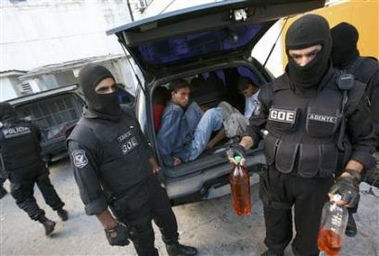Sao Paulo's state governor said gang violence that has rocked Brazil's
business capital Sao Paulo in the past week should serve as a warning to
Brazil's richer classes that the country's deep social inequalities were tearing
it apart.

Brazilian police
arrest men they suspect of trying to burn a public bus in the northeastern
city of Recife, Brazil, as prison riots and other violence spread from Sao
Paulo State to other parts of the country, May 15, 2006.
[Reuters] |
Governor Claudio Lembo, in a full-page interview published in leading
newspaper Folha de S.Paulo, also denied police were carrying out massacres to
quell the violence, in which 152 people have been killed since last Friday.
"All this has been a big wake up for Brazil. The social situation is the
cancer for crime and it is bigger than we imagined," he said.
Brazil's most powerful criminal gang, the First Command of the Capital (PCC),
unleashed a wave of bloodshed in Sao Paulo city and state last Friday night in
retaliation for the transfer of jailed gang leaders and members to a remote
high-security prison.
Some 30 policeman were killed in attacks on police posts, vehicles and
off-duty officers. Dozens of buses were also set ablaze. Related uprisings broke
out in dozens of prisons across the state to demand better conditions.
The attacks caused panic and chaos in Sao Paulo, the world's third largest
metropolis with a population of 20 million. The attacks had largely subsided by
midweek after tough police response. Police have killed 107 suspected gangsters
in operations through poor districts of the city.
Human rights groups, while condemning the gangsters, have expressed concern
the police are resorting to extra-judicial executions to stamp out the violence.
Lembo, asked if the police were carrying out revenge attacks in which
innocent people may be killed, said the police were under control.
"I spoke for a long time with Colonel Elizeu Eclair and I am convinced that
they are acting within the limits," Lembo said. "There are clashes every night
in the streets. The police are acting to avoid the worst for society."
While crime and lawlessness is rampant in Brazil's cities -- in March, army
troops occupied slums in Rio de Janeiro in a blitz against drug traffickers --
the scale of the Sao Paulo gang offensive was unprecedented.
Lembo had candid words for Brazil's upper classes, saying the crime problem
was rooted in the desperate poverty and wide gap between rich and poor in the
nation of 185 million people.
"We have a white minority that is very perverse. The bourgeoisie will have to
open their pockets to lift the misery so there are more jobs, more education,"
he said.
While leftist politicians and humanitarian organizations have long linked
crime to deprivation, Lembo's comments were notable as he is member of the
right-wing Liberal Front Party and comes from a banking background.
Many of Brazil's upper classes endorse repressive police tactics and show
little concern for social problems.
"Brazil is disintegrating and losing its civic values," Lembo said. "Brazil
only believes in the (national soccer) team shirt, which is a symbol of
victory."
Police kept up sweeps throughout the city on Thursday and sporadic incidents
were reported overnight. Fourteen suspected gangsters were killed in the past 24
hours in what security officials said were shoot-outs, although it was not
certain if the victims were directly linked to the PCC campaign.
Eight buses were burned, prompting two bus companies to suspend night
services.
A judge meanwhile ordered PCC chief Marcos Camacho, nicknamed Marcola, be
held for 90 days in solitary confinement at the top-security Presidente
Bernardes penitentiary to prevent him from issuing more orders to his men.
Marcola is reported to have orchestrated the war using a smuggled cell
phone.